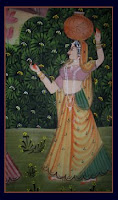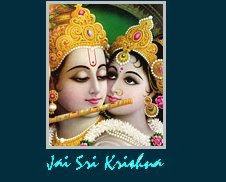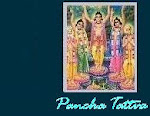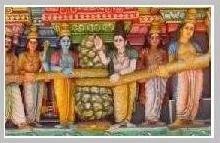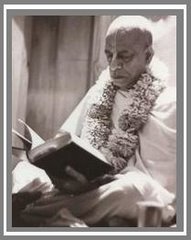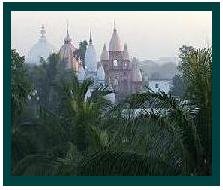 Srimad Bhagavatam 2.4.18 - ACBSP
Srimad Bhagavatam 2.4.18 - ACBSPkirata-hunandhra-pulinda-pulkasa
abhira-sumbha yavanah khasadayah
ye 'nye ca papa yad-apasrayasrayah
sudhyanti tasmai prabhavishnave namah
SYNONYMS
kirata -- a province of old Bharata; huna -- part of Germany and Russia; andhra -- a province of southern India; pulinda -- the Greeks; pulkasah -- another province; abhira -- part of old Sind; sumbhah -- another province; yavanah -- the Turks; khasa-adayah -- the Mongolian province; ye -- even those; anye -- others; ca -- also; papah -- addicted to sinful acts; yat -- whose; apasraya-asrayah -- having taken shelter of the devotees of the Lord; sudhyanti -- at once purified; tasmai -- unto Him; prabhavishnave -- unto the powerful Vishnu; namah -- my respectful obeisances.
TRANSLATION
Kirata, Huna, Andhra, Pulinda, Pulkasa, Abhira, Sumbha, Yavana, members of the Khasa races and even others addicted to sinful acts can be purified by taking shelter of the devotees of the Lord, due to His being the supreme power. I beg to offer my respectful obeisances unto Him.
PURPORT
Kirata: A province of old Bharata-varsha mentioned in the Bhishma-parva of Mahabharata. Generally the Kiratas are known as the aboriginal tribes of India, and in modern days the Santal Parganas in Bihar and Chota Nagpur might comprise the old province named Kirata.
Huna: The area of East Germany and part of Russia is known as the province of the Hunas. Accordingly, sometimes a kind of hill tribe is known as the Hunas.
Andhra: A province in southern India mentioned in the Bhishma-parva of Mahabharata. It is still extant under the same name.
Pulinda: It is mentioned in the Mahabharata (Adi-parva 174.38), viz., the inhabitants of the province of the name Pulinda. This country was conquered by Bhimasena and Sahadeva. The Greeks are known as Pulindas, and it is mentioned in the Vana-parva of Mahabharata that the non-Vedic race of this part of the world would rule over the world. This Pulinda province was also one of the provinces of Bharata, and the inhabitants were classified amongst the kshatriya kings. But later on, due to their giving up the brahminical culture, they were mentioned as mlecchas (just as those who are not followers of the Islamic culture are called kafirs and those who are not followers of the Christian culture are called heathens).
Abhira: This name also appears in the Mahabharata, both in the Sabha-parva and Bhishma-parva. It is mentioned that this province was situated on the River Sarasvati in Sind. The modern Sind province formerly extended on the other side of the Arabian Sea, and all the inhabitants of that province were known as the Abhiras. They were under the domination of Maharaja Yudhishthira, and according to the statements of Markandeya the mlecchas of this part of the world would also rule over Bharata. Later on this proved to be true, as in the case of the Pulindas. On behalf of the Pulindas, Alexander the Great conquered India, and on behalf of the Abhiras, Muhammad Ghori conquered India. These Abhiras were also formerly kshatriyas within the brahminical culture, but they gave up the connection. The kshatriyas who were afraid of Parasurama and had hidden themselves in the Caucasian hilly regions later on became known as the Abhiras, and the place they inhabited was known as Abhiradesa.
Sumbhas or Kankas: The inhabitants of the Kanka province of old Bharata, mentioned in the Mahabharata.
Yavanas: Yavana was the name of one of the sons of Maharaja Yayati who was given the part of the world known as Turkey to rule. Therefore the Turks are Yavanas due to being descendants of Maharaja Yavana. The Yavanas were therefore kshatriyas, and later on, by giving up the brahminical culture, they became mleccha-yavanas. Descriptions of the Yavanas are in the Mahabharata (Adi-parva 85.34). Another prince called Turvasu was also known as Yavana, and his country was conquered by Sahadeva, one of the Pandavas. The western Yavana joined with Duryodhana in the Battle of Kurukshetra under the pressure of Karna. It is also foretold that these Yavanas also would conquer India, and it proved to be true.
Khasa: The inhabitants of the Khasadesa are mentioned in the Mahabharata (Drona-parva). Those who have a stunted growth of hair on the upper lip are generally called Khasas. As such, the Khasa are the Mongolians, the Chinese and others who are so designated.
The above-mentioned historical names are different nations of the world. Even those who are constantly engaged in sinful acts are all corrigible to the standard of perfect human beings if they take shelter of the devotees of the Lord. Jesus Christ and Muhammad, two powerful devotees of the Lord, have done tremendous service on behalf of the Lord on the surface of the globe.
As Śukadeva Gosvāmī began his prayer by discussing the word yat-kīrtanam, so also Lord Caitanya recommended that simply by glorifying the Lord's holy name, a tremendous change of heart can take place by which the complete misunderstanding between the human nations created by politicians can at once be extinguished. And after the extinction of the fire of misunderstanding, other profits will follow. The destination is to go back home, back to Godhead, as we have several times discussed in these pages.
According to the cult of devotion, generally known as the Vaiṣṇava cult, there is no bar against anyone's advancing in the matter of God realization. A Vaiṣṇava is powerful enough to turn into a Vaiṣṇava even the Kirāta, etc., as above mentioned. In the Bhagavad-gītā (9.32) it is said by the Lord that there is no bar to becoming a devotee of the Lord (even for those who are lowborn, or women, śūdras or vaiśyas), and by becoming a devotee everyone is eligible to return home, back to Godhead. The only qualification is that one take shelter of a pure devotee of the Lord who has thorough knowledge in the transcendental science of Kṛṣṇa (Bhagavad-gītā and Śrīmad-Bhāgavatam). Anyone from any part of the world who becomes well conversant in the science of Kṛṣṇa becomes a pure devotee and a spiritual master for the general mass of people and may reclaim them by purification of heart. Though a person be even the most sinful man, he can at once be purified by systematic contact with a pure Vaiṣṇava. A Vaiṣṇava, therefore, can accept a bona fide disciple from any part of the world without any consideration of caste and creed and promote him by regulative principles to the status of a pure Vaiṣṇava who is transcendental to brahminical culture. The system of caste, or varṇāśrama-dharma, is no longer regular even amongst the so-called followers of the system. Nor is it now possible to reestablish the institutional function in the present context of social, political and economic revolution. Without any reference to the particular custom of a country, one can be accepted to the Vaiṣṇava cult spiritually, and there is no hindrance in the transcendental process. So by the order of Lord Śrī Caitanya Mahāprabhu, the cult of Śrīmad-Bhāgavatam or the Bhagavad-gītā can be preached all over the world, reclaiming all persons willing to accept the transcendental cult. Such cultural propaganda by the devotees will certainly be accepted by all persons who are reasonable and inquisitive, without any particular bias for the custom of the country. The Vaiṣṇava never accepts another Vaiṣṇava on the basis of birthright, just as he never thinks of the Deity of the Lord in a temple as an idol. And to remove all doubts in this connection, Śrīla Śukadeva Gosvāmī has invoked the blessings of the Lord, who is all-powerful (prabhaviṣṇave namaḥ). As the all-powerful Lord accepts the humble service of His devotee in devotional activities of the arcana His form as the worshipable Deity in the temple, similarly the body of a pure Vaiṣṇava changes transcendentally at once when he gives himself up to the service of the Lord and is trained by a qualified Vaiṣṇava. The injunction of Vaiṣṇava regulation in this connection runs as follows: arcye viṣṇau śilā-dhīr guruṣu nara-matir vaiṣṇave jāti-buddhiḥ śrī-viṣṇor nāmni śabda-sāmānya-buddhiḥ, etc. "One should not consider the Deity of the Lord as worshiped in the temple to be an idol, nor should one consider the authorized spiritual master an ordinary man. Nor should one consider a pure Vaiṣṇava to belong to a particular caste, etc." (Padma Purāṇa)
The conclusion is that the Lord, being all-powerful, can, under any and every circumstance, accept anyone from any part of the world, either personally or through His bona fide manifestation as the spiritual master. Lord Caitanya accepted many devotees from communities other than the varṇāśramites, and He Himself declared, to teach us, that He does not belong to any caste or social order of life, but that He is the eternal servant of the servant of the Lord who maintains the damsels of Vṛndāvana (Lord Kṛṣṇa). That is the way of self-realization.
* * *
Note: Sometime ago I posted an article titled "Ancestors of Modern Humans".
 The worshiper should meditate upon My subtle form — which is situated within the worshiper's own body, now purified by air and fire — as the source of all living entities. This form of the Lord is experienced by self-realized sages in the last part of the vibration of the sacred syllable oḿ.
The worshiper should meditate upon My subtle form — which is situated within the worshiper's own body, now purified by air and fire — as the source of all living entities. This form of the Lord is experienced by self-realized sages in the last part of the vibration of the sacred syllable oḿ.


